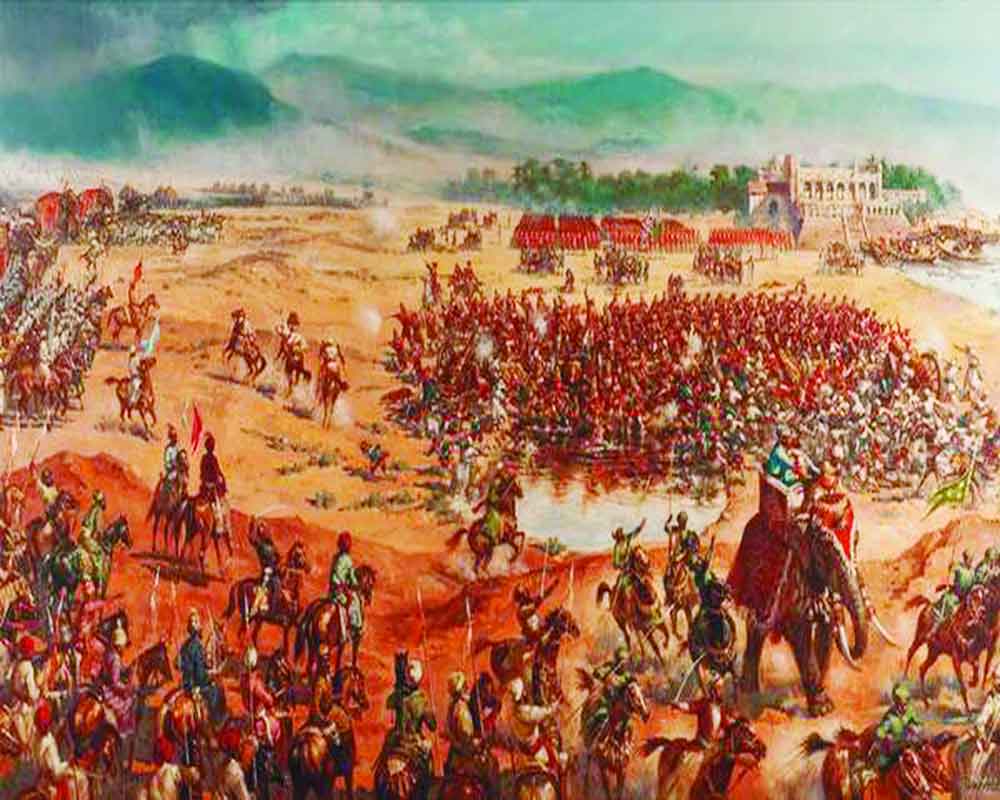The recent mudslinging between the TMC and BJP has highlighted a historical narrative concerning the role of the Roy family in the downfall of Bengal’s Nawab Siraj-ud-Daula
With the campaign for the 2024 Lok Sabha elections heating, mudslinging isn’t left behind, although one wishes this weren’t so. The Trinamool Congress has abused Smt. Amrita Roy, the BJP’s KrishnanagarLok Sabha candidate, for belonging to the family of Krishna Chandra Roy, who had sided with the East India Company to take down Bengal’s Nawab Siraj-ud-Daula in 1757. The current Rajmata of Krishna Nagar has justified her family’s act, saying had they not done so, Sanatana Dharma and Bengali culture under the tyrannical Siraj would have ceased to exist. Moreover, Raja Krishna Chandra Roy, Amrita’s forefather wasn’t alone; Jagat Seth, Raja Naba Krishna Deb and above all Mir Jafar and many others wanted to see the end of Siraj-ud-Daula. Such was the ill-will he had generated.
What would have been Bengal’s fate had these merchant princes not contrived to overthrow Siraj? More than likely, Nadia district and today’s West Bengal might have gone to Pakistan and subsequently Bangladesh. Pakistan’s first President Iskander Mirza was a direct descendant of Siraj-ud-Daula. The family lived in Murshidabad, but on the morrow of Partition, promptly migrated to Karachi, then Pakistan’s capital. Iskander first became defence secretary and then Pakistan’s president in March 1956.
To go back to Murshidabad, Siraj-ud-Daula came to the throne in 1756. He soon showed his colours by dismissing his chief minister RaiDurlabh, picked by his grandfather NawabAlivardi Khan. The young Nawabhumiliated the wealthy state banker Jagat Seth by publicly slapping him in the durbar and threatening him with sunnat, i.e., circumcision (see Plassey to Pakistan by HumayunMirza, son of IskandarMirza). The merchant princes were resentful of the rule by people of Central Asian stock and wanted more say in governance for the local people. However, they lacked the military organisation to effect an overthrow. Come 1757, upon the orders of the East India Company’s Court of Directors in London, Robert Clive arrived from Madras, along with some sailors and soldiers, to teach Siraj-ud-Daula a lasting lesson for humiliating the British at Fort William in Calcutta the previous year. This is where the Black Hole tragedy was perpetrated on the nawab’sorders.
The nawabate’s merchant princes saw this as a rare opportunity to do away with this odious regime. British arms and Bengali money as well as contacts would ensure victory. Clive had only about 3,000 men, whereas Siraj-ud-Daula had an army of a lakh, plus a cavalry and elephants. This large army had to be truncated in numbers. Mir Jafar, who commanded half the army of the Nawab, was promised that if he helped to overthrow Siraj-ud-Daula, he would be made the Nawab. Consequently, over half of Siraj’s army did not fight. The Battle of Plassey on June 23, 1757, ended the saga of Siraj-ud-Daula and his life.
At the time we are talking about, there were two cultures in Bengal, namely Bengali and Islamic. Since the 12th century, the region had been slipping out of Bengali influence and had become two-thirds Arabized. The Battle of Plassey in 1757 was the first decisive setback. After Siraj was defeated and killed and his nawabate erased, Hindus for the first time in many years could celebrate puja openly. A grand Durga Puja was held at the palace of Raja Naba Krishna Deb, where the chief guest was Robert Clive. Imagine if Bengal had remained on the Islamic track, there would have been no historic renaissance for which Bengal is justly renowned and respected. There would have been no Raja Rammohan Roy, no Bankim Chandra Chatterjee, no Rabindranath Tagore, no Ramakrishna Paramhansa and Swami Vivekananda, no Yogi Aurobindo, no Ishwar Chandra Vidyasagar and certainly no Netaji Subhas Chandra Bose. One can only imagine what this region might have become. Gopal Krishna Gokhale, more than a hundred years ago, had famously said “What Bengal thinks today, India thinks tomorrow”. But if the likes of Siraj-ud-Daula had continued on the throne, there would not have been a Bengal today.
Gandhi did awaken Indians to the value of freedom, politics, soul and economics, but the find winner was Netaji Subhas Chandra Bose and his Indian National Army (INA). This was admitted and affirmed by none other than Clement Atlee, Prime Minister of Britain from 1946 to 1951 the British leader who signed the Indian Independence Act of 1947 heralding India’s independence. After relinquishing office, Atlee came to India and was a guest of the then West Bengal Governor Justice P.B. Chakraborty.
During a dinner conversation, Chakraborty asked his guest why the British quit India in a hurry in 1947, when there was no immediate cause, with the Quit India movement of 1942 having failed. The former British Prime Minister in reply quoted several reasons, principal among them being the erosion of loyalty to the British Crown among the Indian army, navy and air force, as a result of the action of Subhas Chandra Bose. Atlee’s reply to Chakraborty’s question on how much the non-violent satyagraha of Gandhi had influenced the British to free India, was “m-i-n-i-m-a-l”, with emphasis on each letter and a contemptuous smile. Had there been no Bengal, there wouldn’t have been a Netaji in the first place.
(The writer is a well-known columnist, an author and a former member of the Rajya Sabha; views are personal)


























